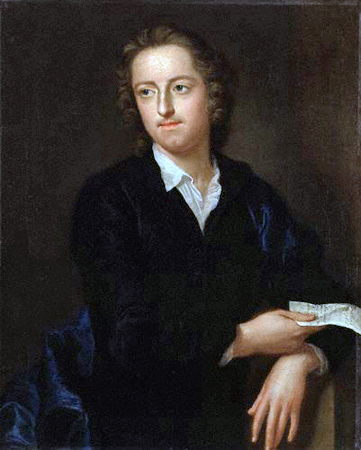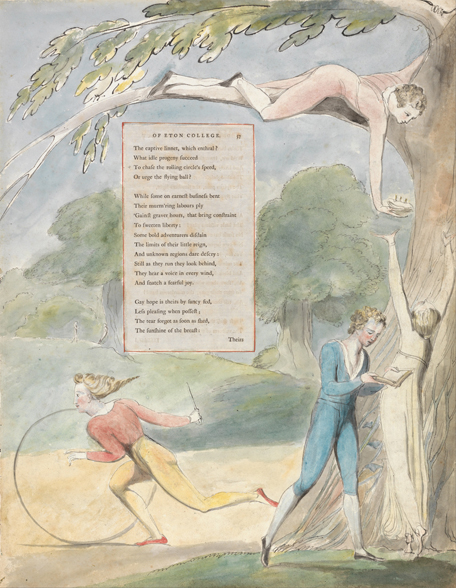| Home Page |
|---|



Thomas Gray was one of the most talented poets to emerge in the 18th century and remains to this day one of Britain's best known poets. He is known for such works as "An Elegy Wrote in a Country Church Yard" and "Sonnet on the Death of Richard West" and he was associated with prominent literary persons of the time such as William Wordsworth and Samuel Johnson.
 Thomas Gray 1716 - 1771
Thomas Gray 1716 - 1771
Thomas Gray's mother was Dorothy Antrobus, daughter of William Antrobus and Jane Goodwin. Her father was a London Scrivener, this being someone who was authorised to draw-up legal documents such a deeds. Dorothy seems to have been quite independently minded, right at the beginning of the 1700s she with her sister, Mary, set up a millinery shop in Cornhill, it was a shop which they successfully ran for many years, even after they were married. Dorothy married Philip Gray, a London Scrivener and stock broker in 1709, possibly because of his position being the same as that of her father. After their marriage the shop formed part of a house belonging to Philip Gray, with the married couple using the rest of it has a house, where presumably Mary, Dorothy's sister also lived. After Dorothy married the main running of their shop probably fell to Mary.
The Antrobus and Gray families were connected by both marriage and a shared background of commerce and profession. They may not have been very wealthy families, they were, non the less, prosperous in a modest way.
The marriage between Philip and Dorothy was not a happy one at all. Philip is described as suffering from fits of insanity and abused his wife, indeed he was described as selfish and brutal and such was his bad treatment of her that at one time his wife took steps to obtain a separation from him. However when she left him he made threats of pursuit and vengeance that would make her life intolerable and so she returned to him. Dorothy would ultimately have to endure many years of this harsh marriage. According to Thomas Gray's biographer, R. W. Ketton-Cremer, Philip Gray was tortured by a corroding Jealousy, he was jealous of his wife's 'kind-hearted' siblings, Robert, William, Anne and in particular Mary Antrobus, and he was even jealous of the success of her millinery shop. As a result he expected her to provide for her clothes and for the education of her son. Philip Gray had inherited his father's wealth, he had been a wealthy London Merchant, but Philip seems to have lost much of this. However he was still a man of some wealth. Despite this, however, he seems to have contributed nothing towards his son's upbringing.
 Page from Thomas Gray's Ode on a Distant Prospect of Eton College with water colour by William Blake
Page from Thomas Gray's Ode on a Distant Prospect of Eton College with water colour by William Blake
It was into this environment that Thomas Gray was born in Cornhill on 26 December 1716, he was the only one of the twelve children of Philip and Dorothy to survive infancy. In the terms of the day all his siblings died of suffocation due to what was known as 'too great a fullness of blood'. This condition could encompass a whole range of illnesses in today's understanding of medical conditions or disorders. In those days, however, this range of conditions was treated by blood letting. It was thought beneficial to treat certain conditions by cutting open a vein and causing the patient to bleed heavily (bleeding the patient). The belief was that by extracting blood the illness could be literally bled away, that is to say "the purging of bad humors", a medical practice dating back to the ancients in Greece and Egypt. Thomas Gray's biographer tells of a story that the child, Thomas Gray, was suffocating when his mother opened one of his veins with her own hand. Thus Thomas Gray owed both his life and his education to his mother, who he described as this "careful, tender mother". In this uneasy household he is said to have grown into a sensitive but intelligent boy, frightened of his father, adored by his mother and aunts, an only child without cousins or close playmates his own age. His became the centre of attention in an elderly household and came to rely on himself and his books for companionship. His uncles, Robert and William Antrobus, were masters at Eton and it is said that they had noticed how lonely he was in the troubled Gray household. His father was at the best of times surly and morose with intervals in his gloom where his mood would descend into bouts of uncontrollable fury. Then he would attack his wife "in the most inhuman manner by beating kicking and punching with the most vile and abusive language". Scenes of this description were still taking place up to twenty five years after their marriage. It is said that she stoically endured this hardship for all those years for the sake of her son. Thomas's uncles saw that they could provide for him an environment where he could thrive, given that his health was already considered feeble and the atmosphere in his home was most dispiriting. So it was that they offered to arrange for Thomas' admission into Eton, an offer his mother readily accepted. Although his father refused to contribute anything towards his schooling, his mother was able to meet much of the cost from the profits earned from her shop, with her brothers contributing towards the remainder.
Thomas Gray entered Eton at his beloved mother's expense, in 1727, and was placed in the care of her brother, Robert Antrobus, for at least some part of his school life. Shortly after his move there William Antrobus became Rector of Everdon in Northamptonshire and left Eton. It seems that Robert Antrobus was keen for Thomas to take up the profession of medicine and instructed Thomas in botany, in particular in the properties of herbs and simples. When Robert Antrobus died in 1730 he bequeathed ' To my nephew Thomas Gray all such books as relate to the study of Physick, provided that he be educated in that profession.' However Thomas never committed to studying medicine. It was at Eton that Thomas met Richard West and Horace Walpole, son of the powerful Whig minister, Sir Robert Walpole. Except for his mother, West was to be the person most dear to Gray; and his death from consumption on 1 June 1742 was to be a devastating loss to the poet. This loss would inspire him to write one of his best known works "Sonnet on the Death of Richard West,"
When Thomas' father died his mother and Mary Antrobus moved to Stoke Poges, where they retired from their business to live with their sister, Mrs Rogers, at West End Farm. There the poet often visited them and had many long stays. In the church grounds, about a mile from the farm, are buried Dorothy, Mary and also Thomas Gray. The Antrobus historian, Reginald Antrobus, noted in his history that Thomas's name does not appear on the tomb that list his aunt and mother - but a tablet on the wall of the chapel placed just above the tomb records that he is buried there with an inscription that he himself had placed there for his mother and aunt.